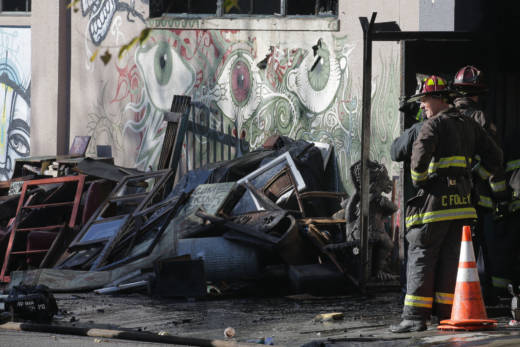Almena and Harris were in red jail jumpsuits and sat at a table with their attorneys. Families of some of the victims attended the hearing.
Almena rented the warehouse and lived there with his family. Harris also lived in the building.
The fire occurred during an unpermitted electronic music concert, and Marin testified that Harris was in charge of the event.
Prosecutors say the men knowingly created a firetrap and deceived the building's owner, police and fire officials about people living there. The two have pleaded not guilty and say they are being scapegoated.
The warehouse had been illegally converted into living space for artists, was cluttered and had no fire sprinklers.
Marin, a musician who was staying at the warehouse, described it as a "museum" filled with musical instruments, trailers and other items, although he said he didn't consider it a fire hazard while he was there.
He said he was alerted to the fire by the smell of smoke. Within seconds, he noticed flames coming from behind a turntable. People were screaming as the power went out.
Marin, who became emotional at times, testified that he remembered the location of an upstairs window that was blocked by a tent-like projection screen set up for the event. He made his way to it with his eyes closed to protect them from smoke.
He tried to alert other people, but it was loud and the screen was blocking their view of the area where the window was, he said. Once at the window, he screamed for help and a ladder.
"'There's people dying in here,'" he recalled shouting. He climbed out and dropped safely to the ground on soft mud. He said he was not injured.
A second witness, Jose Avalos, testified that he was among 15 to 25 people who lived at the warehouse at any given time, and that he paid his rent of $565 a month to Harris.
"I felt like it was a place that would accept me," he said. "I don't really find that too much."
He disputed that Harris was second-in-command at the warehouse and said everyone pitched in to maintain the community.
Tony Serra, an attorney for Almena, said after the hearing that neither witness had established that his client was criminally negligent.
"Thus far, we're unscathed," he said.
Curtis Briggs, an attorney for Harris, said Avalos' testimony helped establish that his client had no leadership role at the Ghost Ship.
